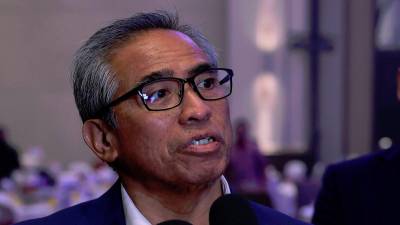SEPANG: Artificial intelligence technology is becoming increasingly vital in the public sector to enhance efficiency and productivity, particularly in government service delivery.
Chief Secretary to the Government Tan Sri Shamsul Azri Abu Bakar stated that AI’s ability to analyse vast amounts of data enables it to detect suspicious financial transaction patterns and issue early warnings of potential irregularities.
“Malaysia’s aspiration to become an AI-driven nation by 2030, as outlined in the 13th Malaysia Plan, requires all public sector personnel to be prepared to face the challenges of governance in the AI era,“ he said when opening the Fourth National Governance, Integrity and Anti-Corruption Research Conference.
Shamsul Azri noted that AI has transformed how people communicate, work, and make decisions in the era of Industrial Revolution 4.0 and rapid advancements in smart technology.
He added that the use of AI in corruption prevention is gaining ground globally, particularly in public service, procurement, and enforcement.
South Korea has strengthened its e-procurement system through the Korea Online e-Procurement System, which integrates AI and blockchain to ensure document authenticity and prevent procurement manipulation.
The country’s Anti-Corruption and Civil Rights Commission has also developed the AI Risk Diagnosis Prediction Platform to assess risks, detect weak integrity systems, and identify potential security threats to the public.
Shamsul Azri said the government has set a target of achieving a top 25 ranking in the Corruption Perceptions Index by 2033, noting that the index is a key indicator for foreign investors and international trading partners.
“The CPI is not only about corruption, but also about the extent to which good governance is upheld in a country,“ he emphasized.
He stressed that civil servants play a critical role in ensuring that every action taken is guided by the principles of integrity and good governance.
A positive perception of the public sector not only reflects service quality but also strengthens public trust, supports sustainable national development, and underpins social stability.
Citing the Prime Minister’s emphasis when tabling the 13th Malaysia Plan, Shamsul Azri said good governance is key to achieving inclusive and sustainable development.
The first Reformation Outcome Threshold highlighted in the Public Service Reform Agenda is the “Appreciation of Values and Governance,“ which requires commitment from all civil service personnel.
Malaysia continues to advance public service reform by strengthening governance through improvements to existing initiatives and new legislation.
These include the Fiscal Accountability Act, amendments to the Audit Act 1957, and the Government Procurement Act.
The two-day conference was jointly organised by the Malaysian Anti-Corruption Commission and the Malaysian Institute of Integrity.
It served as a platform for sharing knowledge, strategies, and best practices in strengthening governance, fostering integrity, and combating corruption. – Bernama
